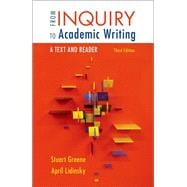
Note: Supplemental materials are not guaranteed with Rental or Used book purchases.
Purchase Benefits
What is included with this book?
Stuart Greene received his Ph.D. in English from Carnegie Mellon in English. He is associate professor of English with a joint appointment in Africana Studies at Notre Dame. His research has focused on the intersections of race, poverty, and achievement in public schools. This work has led to the publication of his co-edited volume, Making Race Visible: Literacy Research for Racial Understanding (Teachers College Press, 2003), for which he won the National Council of Teachers of English Richard A. Meade Award in 2005. He also edited Literacy as a Civil Right (Peter Lang, 2008) and co-edited Bedtime Stories and Book Reports: Connecting Parent Involvement and Family (Teachers College Press, 2010) with Cathy Compton-Lilly. His current book is Race, Community, and Urban Schools: Partnering with African American Families (Teachers College Press, 2013).
April Lidinsky (PhD, Literatures in English, Rutgers) is Associate Professor of Women’s Studies at Indiana University South Bend. She has published and delivered numerous conference papers on writing pedagogy, women's autobiography, creative nonfiction, and film, and has contributed to several textbooks on writing. She has served as acting director of the University Writing Program at Notre Dame and has won several awards for her teaching and research.
9. From Introductions to Conclusions: Drafting an Essay
Drafting Introductions
Developing Paragraphs
Elizabeth Martinez, "Reinventing ‘America’: Call for a New National Identity
Drafting Conclusions
* Analyzing Strategies for Writing: From Introductions to Conclusions
Barbara Ehrenreich, "Cultural Baggage"
10. From Revising to Editing: Working with Peer Groups
Revising versus Editing
The Peer Editing Process
Peer Groups in Action: A Sample Session
An Annotated Student Draft
* Rebcca Jegier, Student-Centered Learning: Catering to Students’ Impatience
Working with Early Drafts
Tasha Taylor (student writer), Memory through Photography
Working with Later Drafts
Tasha Taylor, Memory through Photography
Working with Final Drafts
Tasha Taylor (student writer), Memory through Photography
Further Suggestions for Peer Editing Groups
11. Other Methods of Inquiry: Interviews and Focus Groups
Why Do Original Research?
Getting Started: Writing a Proposal
An Annotated Student Proposal
* Laura Hartigan, Proposal for Research: The Affordances of Multimodal, Creative Writing and Academic Writing
Interviewing
Using Focus Groups
An Annotated Multimedia Research Paper
<online>* Laura Hartigan, Understanding the Unique Affordances of Multimodal, Creative Writing and Academic Writing [multimodal research paper]
<online>* Annotated Poster Presentations of Laura Hartigan’s paper [poster presentation]
* 14. Sociology: How do race, class, and gender influence us?
* Agustin Fuentes, from "The Myth of Race
Peggy McIntosh, White Privilege: The Invisible Knapsack
* Allan G Johnson, Why Do We Make So Much of Gender?
* Matthew Immergut, Manscaping: The Tangle of Male Body Hair, Nature and Culture
* C.J. Pasco, C. J. "’Dude, you’re a fag": adolescent masculinity and the fag discourse
Michael Kimmel, Gender and Terrorism
(2004)
* Elline Lipkin, from "Girl’s Bodies, Girl’s Selves: Body Image, Identity, and Sexuality"
* Barbara Ehrenreich, How I Discovered the Truth about Poverty
* From Cracking the Codes: The System of Racial Inequality [video]
Margaret Talbot, from "Brain Gain: The Underground World of ‘Neuroenhancing’ Drugs"
* Anahi Viladrich, Ming-Chin Yeh, Nancy Bruning, and Rachael Weiss, Do Real Women Have Curves? Paradoxical Body Images among Latinas in New York City
* William J. Peace, "Slippery Slopes: Media, Disability, and Adaptive Sports
* Linda Loma University Medical Center’s Orthotics and Prosthetics Team Gives Brazilian Athlete Ability to Walk [online article with video]
* Terri Oda, The Clearest Graphs You Will Ever See Refuting the Idea that Women Are Bad at Math [click-through presentation]
17. Business and marketing: What is the present and future of marketing? Are we what we buy?
* Naomi Klein, From No Logo
* Dicker, From The United States of Wal-Mart
* Sally Satel and Scott O. Lilienfeld, From The Buyologist Is In: The Rise of Neuromarketing
* Mark R. Tercek and Jonathan S. Adams, From Nature’s Fortune: How Business and Society Thrive by Investing in Nature
* Shalina Shankar, Creating Model Consumers: Producing Ethnicity, Race, and Class in Asian American Advertising
Fareed Zakaria, The Rise of the Rest
Ann duCille, from Multicultural Barbie and the Merchandising of Difference
* Paul Mulhauser and Kelly Bradbury, How Genders Work: Putting Together the J. Crew Catalogue [interactive flip-book]
Assignment Sequences
Appendix: Citing and Documenting SourcesThe New copy of this book will include any supplemental materials advertised. Please check the title of the book to determine if it should include any access cards, study guides, lab manuals, CDs, etc.
The Used, Rental and eBook copies of this book are not guaranteed to include any supplemental materials. Typically, only the book itself is included. This is true even if the title states it includes any access cards, study guides, lab manuals, CDs, etc.